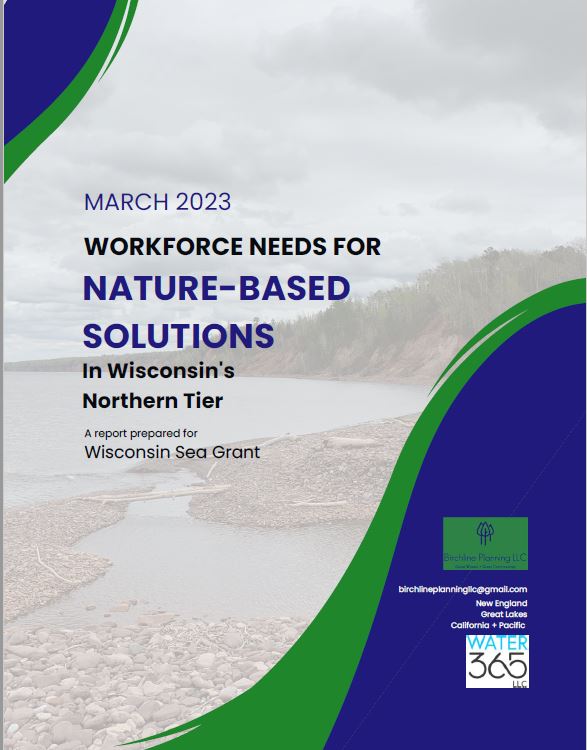Webinar and report available about nature-based jobs in northern Wisconsin
Wisconsin Sea Grant is organizing a webinar and has produced a report regarding the status of nature-based jobs in Wisconsin’s northern tier, which includes Douglas, Ashland, Bayfield and Iron counties.
 The webinar, “What Does Housing Have to do with Green Infrastructure? Workforce Needs in Northern Wisconsin,” is scheduled for noon-1 p.m., Tuesday July 18 on Zoom. Preregister for it here.
The webinar, “What Does Housing Have to do with Green Infrastructure? Workforce Needs in Northern Wisconsin,” is scheduled for noon-1 p.m., Tuesday July 18 on Zoom. Preregister for it here.
The report it is based on, titled, “Workforce Needs for Nature-Based Solutions in Wisconsin’s Northern Tier,” is available for free download from Wisconsin Sea Grant. It was prepared by Birchline Planning LLC and Water 365 LLC.
Natalie Chin, Wisconsin Sea Grant’s climate and tourism outreach specialist, said the report and webinar deal with projects that implement green infrastructure practices in communities. “It’s using the benefits of nature to help communities mitigate or reduce the impacts of climate change that we’re seeing because of lake levels, warming and more rain,” Chin said.
Examples of nature-based solutions include stabilizing shorelines through planting greenery instead of hardening the shoreline with concrete and installing pervious pavers in parking lots that allow water to infiltrate into the soil instead of running off into storm sewers or waterways.
The report found not only strong capacity, interest and strengths in the region that support use of nature-based solutions, but also several unexpected limitations relating to a region-wide housing shortage and limits on municipal fiscal capacity.

Natalie Chin, climate and tourism outreach specialist, Wisconsin Sea Grant. Image credit: Wisconsin Sea Grant
“Overall, the region’s public, private, educational and nonprofit leaders have an exceptional understanding of nature-based solutions and green infrastructure practices,” said Chin. “However, the region is held back by the sheer lack of people available to carry out this work. Housing availability was cited as the single most difficult limitation on recruitment. Also, communities need more capacity when it comes to project management. Writing grants and executing them is a full-time job just by itself for these types of projects.”
As next steps, this report recommends that Wisconsin Sea Grant and its regional partners consider options to build grant and project management capacity, address the regional housing shortage, work toward legislative reform and facilitate training that will support specific needs in the northern tier around nature-based solutions. Case studies of efforts in other rural regions are provided to illustrate successful strategies from other areas.
During the July 18 webinar, report authors Juli Beth (JB) Hinds and Linda Reid will share their key findings. This will be followed by a panel discussion where people who were interviewed for the report will share their perspectives. These include Alex Faber, executive director, Superior Rivers Watershed Association; Sara Hudson, director, City of Ashland Parks and Recreation; and Philomena Kebec, economic development coordinator, Bad River Band of Lake Superior Chippewa.
The post Webinar and report available about nature-based jobs in northern Wisconsin first appeared on Wisconsin Sea Grant.News Releases | Wisconsin Sea Grant
News Releases | Wisconsin Sea Grant
https://www.seagrant.wisc.edu/news/webinar-and-report-available-about-nature-based-jobs-in-northern-wisconsin/
